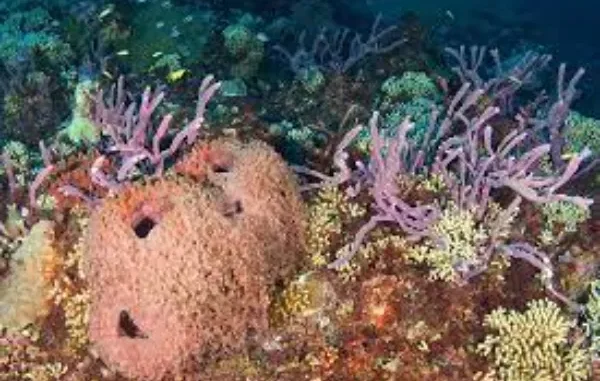
We present some interesting facts about sponges. Sea sponges are fascinating creatures that have been around for millions of years. While they may seem simple, there are many sponge facts that make them worth learning about. From their unique feeding habits to their ability to regenerate, sponges are truly remarkable organisms. In this article, we will explore some of the most intriguing facts about sponges. We will also gain a greater appreciation for these often overlooked creatures of the sea.
“The Surprising World of Sponges: 5 Interesting Facts About Sponges You Never Knew”
Sponges may seem like simple creatures, but they actually have a fascinating world of their own. Here are 5 interesting facts about sponges that you may not have known:
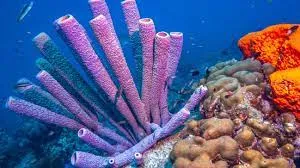
- Sponges are the oldest living animals on Earth: Sponges have been around for over 500 million years, making them some of the oldest living animals on our planet. They have survived countless changes in the environment and have evolved into a wide variety of shapes and sizes.
- Sponges come in all shapes and sizes: While most people may think of sponges as the soft, squishy cleaning tools we use in the kitchen, there are actually over 5,000 different species of sponges in the world. They come in a wide range of shapes, sizes, and colors, from tiny encrusting sponges to large barrel sponges that can grow several feet in diameter.
- Sponges are filter feeders: Sponges are unique in that they are filter feeders, meaning they feed by pumping water through their bodies and filtering out tiny particles of food. They are able to extract nutrients from the water, such as bacteria, plankton, and other organic matter, which they then use to sustain themselves.
- Sponges are essential to marine ecosystems: Sponges play a crucial role in marine ecosystems by filtering out harmful substances from the water, providing habitats for other marine organisms, and even producing chemical compounds that have potential medicinal uses. They are often referred to as the “lungs of the ocean” for their ability to clean and oxygenate the water.
- Sponges have remarkable regenerative abilities. Sponges have the remarkable ability to regenerate and repair themselves, even after being damaged or broken apart. This ability has made them a focus of research in regenerative medicine. Scientists are studying how sponges are able to repair themselves in the hopes of applying this knowledge to human health.
“Underwater Marvels: 7 Mind-Blowing Sponges Facts”
Sponges are fascinating creatures that inhabit the world’s oceans, providing important ecological functions. They serve as a source of wonder for scientists and nature enthusiasts alike. Here are seven mind-blowing sponge facts that highlight their unique characteristics:
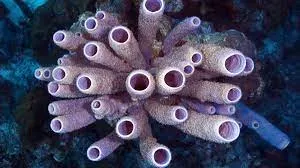
- Diversity: Sponges are incredibly diverse, with over 9,000 species identified so far. They come in a wide range of shapes, sizes, and colors, making them a visually stunning part of the marine ecosystem.
- Filter feeders: Sponges are filter feeders, meaning they filter tiny particles from the water to obtain food. They play a crucial role in maintaining water quality by removing bacteria, algae, and other organic matter from the surrounding environment.
- Ancient lineage: Sponges are one of the oldest animal groups on Earth, with a lineage that dates back over 500 million years. They are considered living fossils, providing valuable insights into the evolution of animal life.
- Regenerative abilities: Sponges have remarkable regenerative abilities, allowing them to repair and regrow damaged or lost tissues. This unique trait has attracted the interest of researchers studying tissue regeneration and potential medical applications.
- Symbiotic relationships: Many sponges form symbiotic relationships with other marine organisms, such as bacteria, algae, and small animals. These partnerships can provide sponges with nutrients, protection, and other benefits, enhancing their survival and reproductive success.
- Chemical diversity: Sponges produce a wide variety of bioactive compounds, some of which have pharmaceutical potential. These compounds have been studied for their anti-cancer, anti-inflammatory, and antibiotic properties.
- Ecological importance: Sponges are key components of marine ecosystems, providing habitat and food for a variety of organisms. They contribute to biodiversity, nutrient cycling, and ecosystem stability, making them essential players in the health and functioning of marine environments.
“From the Ocean Depths: Uncovering the Interesting Facts About Sponges”
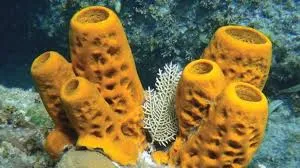
Sponges, often overlooked in the vast expanse of the ocean, are surprisingly complex creatures. These simple organisms, belonging to the phylum Porifera, play a crucial role in marine ecosystems. They have a rich evolutionary history dating back millions of years. There are many interesting facts about sponges.
Sponges are filter feeders, meaning they feed by pumping water through their porous bodies and extracting nutrients from microscopic particles. Their unique anatomy allows them to efficiently capture and digest food. This makes them important contributors to the overall health of the ocean.
One of the most remarkable aspects of sponges is their ability to regenerate and adapt to changing environmental conditions. If a sponge is damaged or threatened, it can regenerate and grow back. This ensures their survival in the harsh underwater world.
Furthermore, sponges have been found to produce a wide range of bioactive compounds that have potential medical applications. These compounds have been studied for their antibacterial, antifungal, and anti-inflammatory properties.
“Sponge Secrets Revealed: 6 Astonishing Sponge Facts That Will Amaze You”
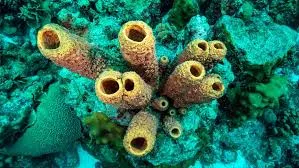
Sponges may seem like simple creatures, but they actually hold some fascinating secrets that will leave you in awe. Here are six astonishing sponge facts that will amaze you:
- Ancient organisms: Sponges are some of the oldest multicellular organisms on Earth, with fossil records dating back over 600 million years. They have been around since before the dinosaurs!
- Filter feeders: Sponges are filter feeders, meaning they obtain food by filtering tiny particles from the water around them. They play a crucial role in maintaining water quality in ocean ecosystems.
- Regeneration: Sponges have an incredible ability to regenerate lost or damaged body parts. If a sponge is broken into pieces, each piece has the potential to grow into a new sponge.
- Biodiversity: There are over 9,000 known species of sponges, ranging in size from a few millimeters to over 3 meters long. They come in a variety of shapes, colors, and textures, making them a diverse group of organisms.
- Symbiotic relationships: Sponges often form symbiotic relationships with other organisms, such as algae and bacteria. These partnerships can provide benefits such as protection, food, or waste removal.
- Potential medical applications: Scientists are exploring the therapeutic potential of sponge compounds for treating a variety of medical conditions, including cancer, infections, and inflammation. Some sponge-derived compounds have already been used in drugs and other medical treatments.
Conclusion
Sponges are fascinating creatures that play important roles in marine ecosystems. Their unique characteristics, such as their ability to filter water, make them an intriguing subject of study. Despite their simple appearance, sponges possess complex biological features. By learning more about sponges, we can gain a better understanding of the biodiversity and complexity of life in the ocean.
Leave a Reply